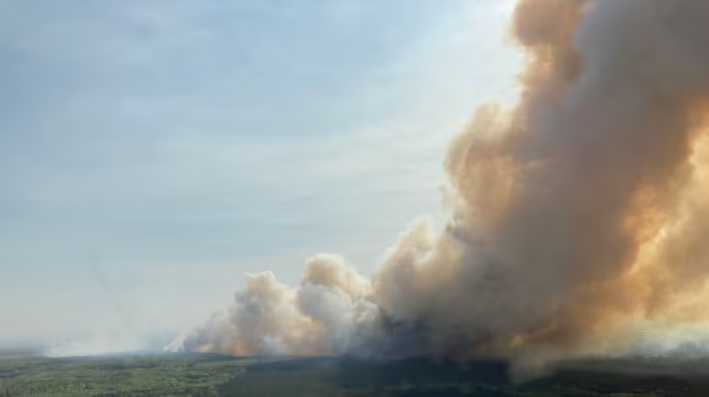Fears of more floods and fires in B.C. Interior as forecast shows temperatures topping 30 C

Heat building into weekend; smoky skies expected for swath of province over next 48 hours
A spell of unseasonably warm weather forecast for most of British Columbia is raising concerns for further flooding and wildfires.
Emergency Management Minister Bowinn Ma says the heat, which is expected to push past 30 C by the weekend in many areas, will affect the pace of snowmelt — which has already sent river levels over their banks in several parts of central and southeastern B.C.
Dave Campbell with the B.C. River Forecast Centre told a briefing on Monday that above-seasonal temperatures have burned through about a quarter of the province’s snowpack, which is much faster than normal.
The province’s snow basin map shows snowpack ranging from a low of 47 per cent of normal in the Skagit area to 235 per cent in the Liard region.
It shows snowpack in the Lower Thompson basin is at 171 per cent of the normal level for this time of year, while in the Okanagan it’s at 144 per cent of normal.
However, the bulletin posted Tuesday notes the snowpack has significantly changed since the measurements were taken last week, given the recent warm weather — and it’s expected to get hotter in the coming days.
Temperatures to top 30 C this weekend
Environment Canada is forecasting Kamloops will hit a high of 34 C on Sunday, while temperatures will reach 33 C in Prince George.
In Fort St. John, where two large wildfires are burning nearby, a high of 32 C is expected on Sunday.
The unusual heat elevates the risk of current wildfires growing and new ones igniting.

There are more than 50 fires burning in B.C., most of them in the north and central part of the province.
The situation is still significantly worse in Alberta, where more than 29,000 residents have been ordered to leave their homes in recent days due to dozens of wildfires.
Ma says the forecast does not call for a heat dome like the one that killed hundreds of people in the summer of 2021, but extreme heat can still be a risk to human health and the government is able to support communities by opening cooling centres if needed.
Smoky skies
Meanwhile, Environment Canada says wildfire smoke from northern Alberta is causing poor air quality and reduced visibility in parts of the northeast and central Interior regions of British Columbia.
Special air quality statements are in place for the North Peace, Fort Nelson, Prince George, Stuart-Nechako, Williston and Yellowhead regions, as well as parts of the Cariboo including Quesnel and Williams Lake.
Environment Canada says all of these regions are already being affected or likely to be affected by wildfire smoke over the next 48 hours.
Advisories are also in place for much of Alberta.
The weather service says wildfire smoke can be harmful and everyone should try to find a place where they can get clean, cool air.
2 out-of-control fires pose risks in B.C.
Two out-of-control wildfires of note in northeastern B.C. are causing particular concern.
Both the Red Creek and Boundary Lake fires pose a threat to property near Fort St. John, about 800 kilometres north of Vancouver.
Evacuation orders or alerts remain in place for much of the areas surrounding the fires.
The Peace River Regional District says five homes are still under an evacuation order for the Boundary Lake wildfire and 260 homes are under an alert. For the Red Creek wildfire, 61 properties remain under an evacuation order, and 247 properties are under an alert.
Evacuation orders were downgraded for 21 properties near the Boundary Lake fire on Tuesday evening.
“Returning residents are being advised to use extra caution as there are downed powerlines throughout the area,” read a statement from the regional district. “All downed power lines should be treated as dangerous, and it’s important to stay at least 10 metres away.”
Clearview Elementary and Junior Secondary School — located 17 kilometres west of Boundary Lake — are closed for the entire week.
Matt Troiano, Fort St. John’s deputy fire chief and director for the city’s Emergency Support Services, said about 100 evacuees have been helped at a reception centre in the city so far.
As of Tuesday morning the Boundary Lake fire was estimated to be 59 square kilometres in size while the Red Creek fire is 28 square kilometres.
Related News
Trade war, slumping border traffic: What does that mean for the Gordie Howe bridge?
Amid U.S. President Donald Trump’s tariffs which have triggered a trade war with Canada, cross-border trips haveRead more
Trump administration threatens Harvard’s foreign enrolment, tax-exempt status
U.S. Homeland Security Secretary Kristi Noem speaks during an event on April 9, in Washington,Read more
